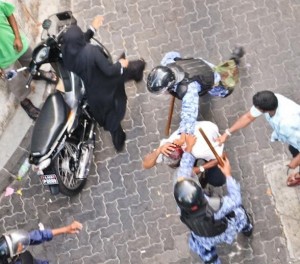Speaker of Parliament Abdulla Shahid has warned President of the Judicial Services Commission (JSC) Adam Mohamed that he would boycott the commission’s meetings should Chair of Civil Service Commission (CSC) Mohamed Fahmy Hassan continue to be a part of it.
Shahid’s warning came shortly after Attorney General Aishath Bisham conceded during a meeting with Parliament’s Executive Oversight Committee (EOC) that any JSC meetings including Fahmy would have no legal effect.
In response to a question by the committee chair, opposition Maldivian Democratic Party (MDP) MP Ali Waheed, Bisham insisted that Mohamed Fahmy Hassan would not have to be reinstated as chair of the Civil Service Commission (CSC) after the Supreme Court ruled that his removal by parliament was unconstitutional.
Fahmy was dismissed from his CSC post in November 2012 in a no-confidence vote in parliament following an inquiry by the Independent Institutions Committee into allegations of sexual harassment against a CSC employee.
Both Fahmy and the victim were summoned to the committee after the complaint was lodged in the first week of June.
Fahmy was alleged to have called the female staff member over to him, taken her hand and asked her to stand in front of him so that others in the office could not see, and caressed her stomach saying “It won’t do for a beautiful single woman like you to get fat.”
MPs voted 38-32 to approve the committee’s recommendation to remove Fahmy from the post.
The Supreme Court however ruled 6-1 in March 2013 that Fahmy would receive two punishments for the same crime if he was convicted at court following his dismissal by parliament (double jeopardy).
The Supreme court contended that the Independent Institutions Committee violated due process and principles of criminal justice procedure in dealing with the accused.
In a letter sent on Monday, Speaker of Parliament – who is by virtue of his position, a member of JSC – stressed that even though the chair of CSC is also by virtue of his position a member of JSC, Fahmy cannot sit in JSC because he had been deposed from his position by parliament.
He added the parliament had informed President Mohamed Waheed Hassan about its decision.
“In that letter, when the parliament came to the decision [to remove Fahmy], then-Attorney General Aishath Azima Shukoor and current Attorney General Aishath Bisham stated that Mohamed Fahmy Hassan could not sit in JSC as the President of CSC as that position had become vacant with the parliament’s decision.”
“The Attorney General Aishath Bisham had also said that JSC meetings attended by Fahmy cannot be deemed legal, during the 46th committee meeting of parliament’s executive oversight committee on June 4, 2013,” Shahid wrote.
Therefore, Shahid claimed that he would not take part in any meetings attended by Fahmy.
Speaking to Minivan News on Monday JSC Media Official Hassan Zaheen confirmed receipt of the letter from Speaker Shahid but said he did not see the need for the commission discuss the matter as it was “not part of the commission’s mandate as per the law”.
Don’t put me in a trap – President Waheed
President Mohamed Waheed Hassan speaking on the issue said it was “very complicating” for him to make a decision about Fahmy.
Fahmy had previously claimed in the media that he would only take a decision on whether to continue being part of CSC after President Waheed made a decision on the issue, claiming that it was the President who had given him the letter of appointment.
Instead of addressing the issue directly, Waheed, who appeared unwilling to address the matter during a press conference on Monday, told the media that Parliament and the Supreme Court were in dispute over the matter.
At such a complicated time, Waheed said, “Even individuals must help in resolving conflicts peacefully”.
“Always doing something that puts the President or the government in a trap is not a very good thing. I think the best thing to do at this time is let Fahmy take the initiative and decide on the matter. That is my position,” he said.
The parliament has meantime opened the opportunity for interested candidates to apply for the “vacant” position of CSC President.
Waheed however maintained that, prior to any appointments to the commission, the parliament should discuss the matter with the Supreme Court to avoid any further conflict.
 While riot police baton-charged the front line of protesters on February 8, Minivan News observed riot police also charging the crowd from a narrow alley leading to the Maldives Monetary Authority (MMA) area.
While riot police baton-charged the front line of protesters on February 8, Minivan News observed riot police also charging the crowd from a narrow alley leading to the Maldives Monetary Authority (MMA) area.